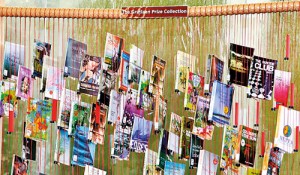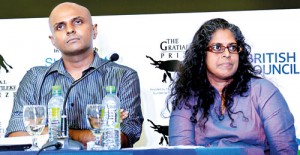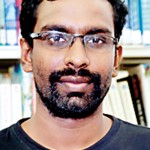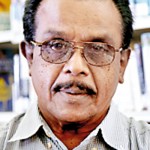2014 Gratiaen shortlist: Socio-political commentary to humour hold sway
“The arts are not like a political election where the winner takes all. The arts are hopefully a true democracy. No one writer creates a literary culture. Several people, essayists and poets and novelists and critics and publishers and thereby, readers do,” remarked Michael Ondaatje at the first presentation of the Gratiaen Prize many moons ago. It was only fitting that on the evening of the 22nd edition of the Prize, the Gratiaen Trust instinctively reached out for the words of its founder before announcing this year’s shortlist.

Now on the shelves at the British Council library: 120 books by Gratiaen Prize winners and shortlisted writers
Founded in 1993, the Gratiaen Prize was set up by Booker Prize-winner Michael Ondaatje to share the wealth received and inculcate and celebrate Sri Lankan writing in English. The Prize is awarded to the best work in English by a Sri Lankan writer residing in Sri Lanka. The announcement of the Gratiaen shortlist was hosted by the British Council. This year, the evening’s proceedings were preluded by the inauguration of the Gratiaen Prize Collection at the British Council library – library goers can now peruse 120 books by Gratiaen Prize winners and shortlisted writers.
The judging panel for 2014 comprised Sonali Deraniyagala (Chair), Dinali Fernando and Jehan Aloysius. Absent from the proceedings but expected to attend the main event, Sonali Deraniyagala teaches at SOAS, University of London and at SIPA, Columbia University, New York. She is the author of the internationally acclaimed memoir ‘Wave’.
A lecturer in English at the University of Kelaniya, Dinali Fernando has a scholarly and personal interest in Sri Lankan English and Sri Lankan writing in English. Rounding up the panel is theatre practitioner, Jehan Aloysius whose plays have been performed locally and internationally.
Unlike the all-poetry shortlist the previous year, the 2014 shortlist saw prose taking precedence. The writers were asked to give a quick introduction about themselves and their work while an excerpt was read out by readers appointed by the Trust. ‘Rao’s Guide to Lime-Pickling’ by Sandali Ash, the youngest on the shortlist, was lauded for its “clear, engaging narrative, its credible characters, its imaginative plot with its clever twists and for its creative use of language”. Quintus G. Fernando was shortlisted for his novel ‘Celibacy Factor’ which read “like a humorous parable with heightened characterization and situations. The judges commented on the novel’s humorous antihero (a young priest) and the depiction of his journey and that of his villagers.
The only collection of poetry to make the shortlist was Vihanga Perera’s ‘Love and Protest’. The panel recognized the exploration of themes and the bold, challenging and consistently engaging nature of the poems as well as its commentary of the personal tempered with the political. Also shortlisted was Santhan Ayathurai with ‘Rails run parallel’. The shortlist was announced in alphabetical order of the writer’s surname and Santhan, whose surname and first had been mixed up, quipped that he had all but given up hope when the announcements were underway. His work was commended for its introspection, use of detail and subtle simplicities as well as “for its ability to delve into the personal experience of dislocation, ethnicity and identity”.
After the first vetting by the Trust, the judges sifted through 24 submissions before culling it down to the final four. Speaking on behalf of the panel of judges, Dinali Fernando made a few general remarks on the overall submissions. As with the previous year, the unevenness in the quality of the writing was lamented. Weaknesses in this year’s entries also included a lack of depth and complexity in some works. It was remarked that there was enthusiastic but unskilled writing in need of more work while some very promising submissions were first drafts in need of polishing and skilled editing. An emergent interest in the fantasy genre was noted in this year’s submissions as well as the diversity and originality of the content.

Two of the judges: Jehan Aloysius and Dinali Fernando. Pix by M.A. Pushpa Kumara
Aimed at promoting collaborations between literature of all three languages, the H.A.I. Goonetileke Prize for Translation will also be announced at the main event. The judges for the 2014 H.A.I. Goonetileke Prize are: Sunil Wijesiriwardhane (Chair), playwright, cultural commentator and social activist who holds a PhD from Moscow University; Prof. Kusuma Karunaratne, Emeritus Professor, University of Colombo; and Krishantha Fedricks, a cultural critic and Senior Lecturer in Sinhala language and linguistics at the Department of Sinhala, University of Colombo.
The winner of the Gratiaen Prize 2014 and the H.A.I. Goonetileke Prize for Translation will be announced on Friday, June 12 in Colombo.
| Meet the shortlisted writers Sandali Ash Sandali has a Bachelor’s degree in Mathematics andis currently reading for a Masters in Financial Economics. Her unpublished novella ‘Rao’s Guide to Lime Pickling’ was prompted by a suggestion by her thesis mentor to write a book instead of a research paper. She was 21 when she wrote the first draft of the novella two years ago. ‘Rao’s Guide to Lime Pickling’ is the compilation of memories of a young boy growing up in the North of Sri Lanka during the last two decades of the war. Although war, violence and politics create the framework for the narrative, it is a story of life and is fiction set against real events. “My favourite author is Gabriel Garcia Marquez whose novel ‘One Hundred Years of Solitude’ changed the way I felt about storytelling, while Paulo Coelho’s ‘The Alchemist’ inspired me to write simply,” says Sandali. This is her first work. Quintus G. Fernando “My novel is written as a personal diary kept by a young priest in a fishing village where the people are the poorest of the poor. He has to deal with the harsh reality of their lives. But by getting closer and closer to their lives, he is also compelled to face his own inner battles,” explains Quintus about his published novel and first submission to the prize, ‘Celibacy Factor’. Quintus holds a PhD from the University of London (his subject of specialty is “Minorities in Sri Lanka with special reference to the Donoughmore Commission”) and was the Rector of a leading school in Colombo. In the US at the invitation of University of Notre Dame in Indiana he returned to Sri Lanka recently.
Vihanga Perera’s collection of poems ‘Love and Protest’ deals with the very themes it is named after – love and protest. The collection was compiled by Paw Print Publishing who undertook Vihanga’s poetry as a project. The collection contains poems written during October 2013 – November 2014. Vihanga started writing in his teens and has been shortlisted for the Gratiaen prize previously, in 2006 and 2008. Ayathurai Santhan Ayathurai Santhan’s ‘Rails Run Parallel’ is set in the backdrop of the 1977 riots and deals with human nature and relationships. The binaries of love and hatred, understanding and misunderstanding, selfishness and altruism, past and present run parallel in human life and is reflected in this novel, as well. He explains that the first draft had been fermenting for a long time and the 2014 call for entries for the prize proved to be the final push which propelled him to complete the novel. “Writers always start as good readers and it was true in my case as well. Reading made me write first in my mother tongue, Tamil, from my high school days. After two decades I started trying my hand in English as well,” explained Santhan. An Engineer by profession, Santhan is a lecturer at a leading private educational institution.
|




 Vihanga Perera
Vihanga Perera